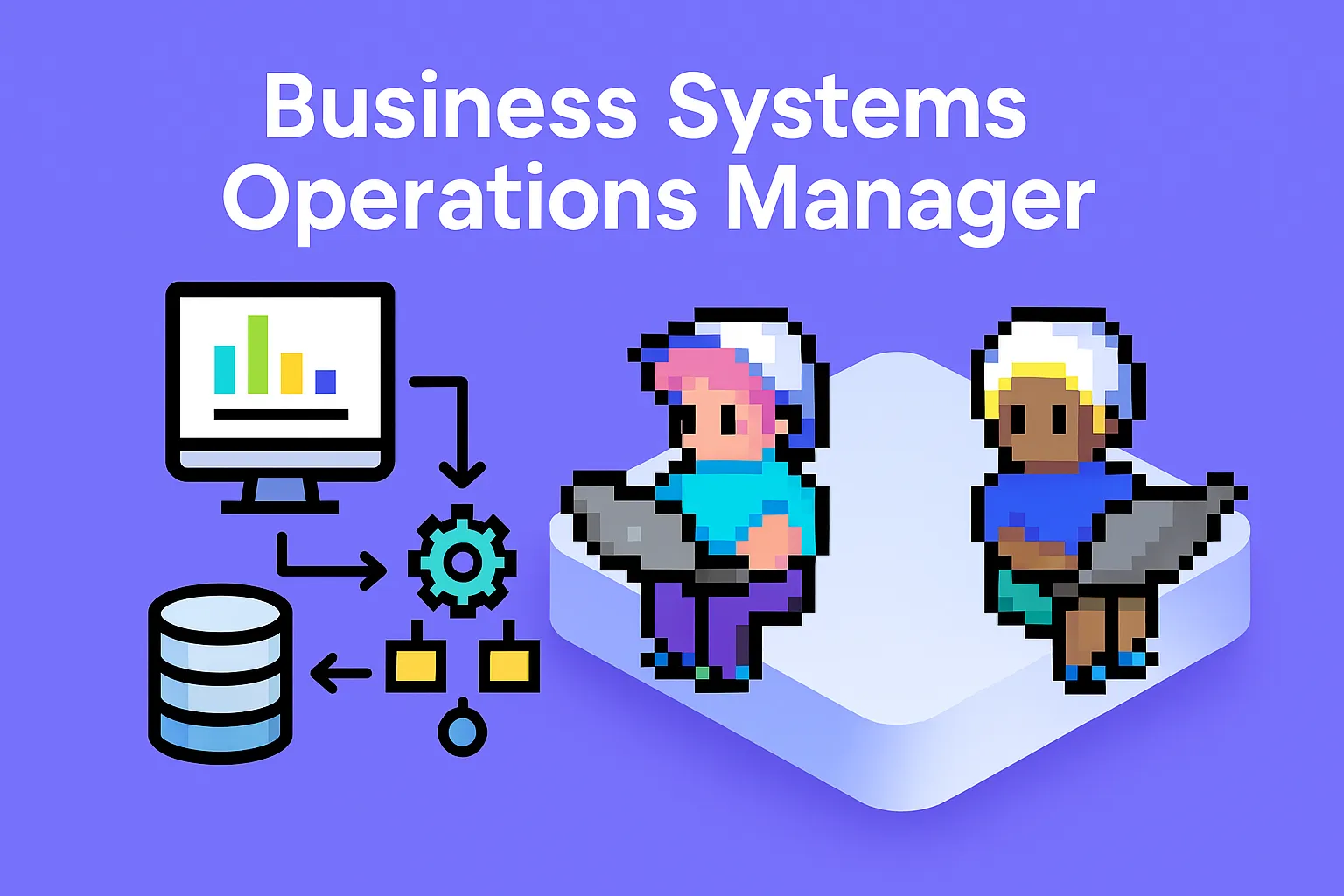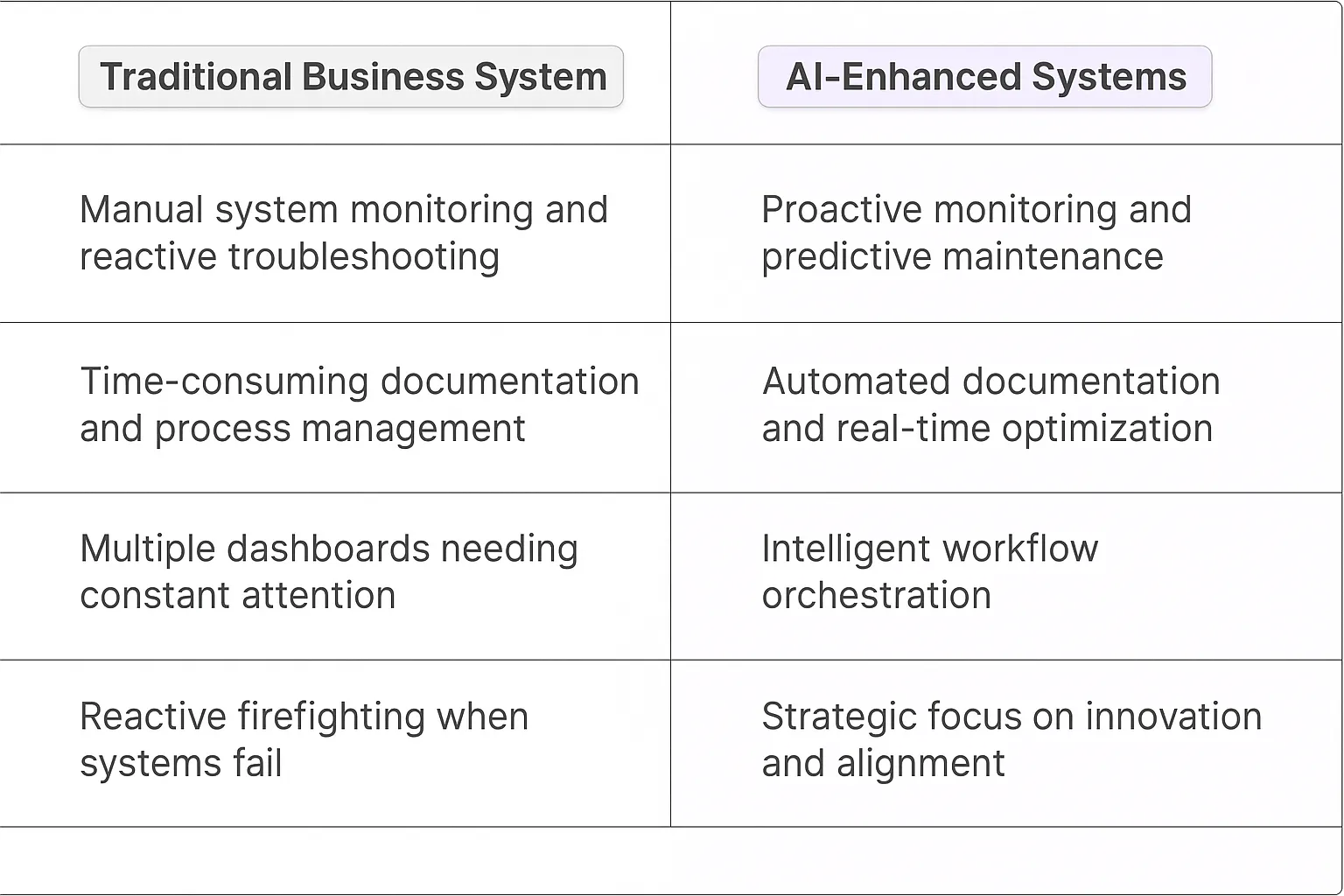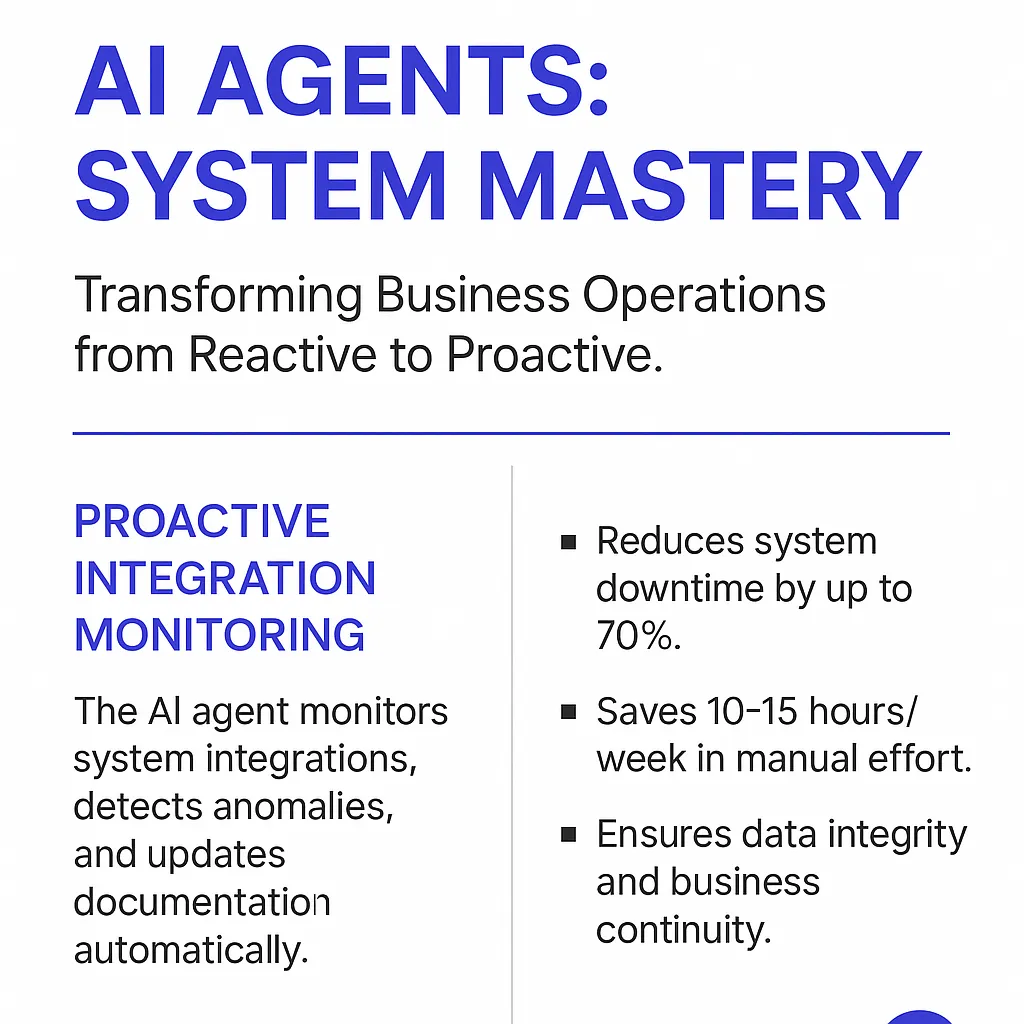A Business Systems Operations Manager orchestrates the complex ecosystem of enterprise applications, databases, and integrations that power modern organizations. They ensure smooth data flows, maintain system health, and optimize technical processes that support business operations. With AI Agents, this role evolves from reactive troubleshooting to proactive system optimization.

Business Systems Operations Managers traditionally relied on a complex web of manual processes, spreadsheets, and basic automation tools. They'd spend countless hours documenting processes, creating SOPs, and manually checking system integrations. The real pain point? They were constantly context-switching between different tools and platforms, trying to maintain visibility across the entire tech stack.
The old approach involved:
The introduction of AI Agents fundamentally shifts how Business Systems Operations Managers work. These digital teammates operate as a force multiplier, handling routine operations while enabling managers to focus on strategic initiatives.
Key benefits include:
The most significant shift is how AI Agents transform the role itself. Business Systems Operations Managers can evolve from reactive firefighters to strategic architects, focusing on system innovation and business alignment rather than routine maintenance.

When we look at how digital teammates integrate into business systems operations, we're seeing a fascinating network effect develop. The more these AI agents interact with your tech stack, the more they learn about your specific system configurations, common failure points, and optimal solutions.
What's particularly interesting is how this creates a compounding advantage. Your digital teammate becomes increasingly proficient at identifying patterns in system behavior, predicting potential issues before they escalate, and suggesting proactive measures. This isn't just about automation - it's about building institutional knowledge that scales.
The real unlock happens when these AI agents start connecting dots across different systems. They might notice that every time there's a spike in Salesforce activity, your NetSuite integration needs additional monitoring. Or they could identify that certain types of user permission changes consistently lead to downstream effects in other applications.
This is where the magic happens - your digital teammate isn't just handling tasks, they're becoming a systems thinking partner that operates at machine speed with human-level context understanding. That's the kind of leverage that creates exponential improvements in systems operations.
Start small with focused use cases where your AI agent can learn your system's specific quirks and requirements. Begin with monitoring tasks and documentation generation, then gradually expand to more complex system management responsibilities as the AI builds context about your environment.
The key is to treat your digital teammate as a systems operations apprentice that's learning your specific business context. Feed it historical incident data, system documentation, and standard operating procedures. The more context it has, the more valuable its contributions become.

Business Systems Operations Managers face an increasingly complex web of tools, processes, and cross-functional dependencies. AI agents are becoming the secret weapon for scaling operations and maintaining system integrity across the enterprise. The real power emerges when these digital teammates handle the heavy lifting of system maintenance, data validation, and process optimization.
From manufacturing plants coordinating multiple ERP instances to healthcare networks managing patient data systems, AI agents excel at the intricate dance of keeping business systems running smoothly. They're particularly effective at identifying bottlenecks, flagging anomalies, and maintaining compliance standards - tasks that traditionally consumed countless hours of manual oversight.
The impact is especially pronounced in regulated industries where system uptime and data accuracy directly affect the bottom line. When AI agents take on the routine monitoring and maintenance tasks, Business Systems Operations Managers can focus on strategic initiatives and system improvements that drive real business value.
The manufacturing sector presents a fascinating case study for Business Systems Operations Manager AI agents. At a major automotive parts manufacturer I recently analyzed, their legacy systems created daily friction - production scheduling software wouldn't sync with inventory management, while quality control data lived in spreadsheet silos.
The company deployed an AI Systems Operations Manager that fundamentally changed how their technical infrastructure functioned. This digital teammate took ownership of the complex web of manufacturing execution systems (MES), enterprise resource planning (ERP), and quality management software.
What's particularly compelling is how the AI agent handled system integration challenges that previously required weeks of manual IT work. When the manufacturer added new robotics controllers to their assembly line, the AI Systems Manager automatically:
The results were striking - system downtime decreased by 64% within 3 months. But the real magic happened in the AI's ability to surface actionable insights from the newly connected systems. It identified patterns showing that micro-delays in one part of the production line created compounding inefficiencies downstream - something human managers had missed for years.
This isn't just about keeping systems running smoothly. The AI Systems Manager essentially functions as a central nervous system for manufacturing operations, creating a level of technical cohesion that transforms how modern factories operate. The implications for manufacturing efficiency and innovation are profound.
A large healthcare network I've been tracking recently demonstrated the transformative potential of Business Systems Operations Manager AI agents. Their challenge was massive - 12 hospitals, 200+ clinics, and a maze of disconnected electronic health records (EHR), billing, and scheduling systems that caused constant headaches for their IT teams.
The network implemented an AI Systems Operations Manager that brought a new level of intelligence to their technical infrastructure. This digital teammate didn't just monitor systems - it actively orchestrated the complex dance between patient management platforms, insurance verification systems, and clinical databases.
The most fascinating aspect was watching how the AI agent handled the network's interoperability challenges. When integrating a new telehealth platform across their facilities, the Systems Manager:
The impact was dramatic - system integration time dropped from months to weeks, while cross-platform errors decreased by 78%. But the real breakthrough came from the AI's ability to identify systemic inefficiencies. It discovered that certain scheduling patterns were creating unnecessary strain on their database systems during peak hours, leading to micro-slowdowns that affected patient care.
This goes beyond traditional IT operations management. The AI Systems Manager effectively serves as an intelligent orchestrator, ensuring that the technical backbone of healthcare delivery remains robust and responsive. For healthcare networks struggling with digital transformation, this approach represents a fundamental shift in how they manage and optimize their technology infrastructure.
Implementing a Business Systems Operations Manager AI agent requires careful navigation of several technical complexities. The agent needs access to multiple business systems simultaneously - from ERPs to CRMs to workflow tools. Each system has its own API limitations, authentication requirements, and data structures. We've seen companies struggle when their systems lack proper API documentation or have outdated integration points.
The effectiveness of your operations manager agent lives and dies by data quality. Cross-system data inconsistencies create major headaches - like when customer records don't match between Salesforce and NetSuite, or when process documentation becomes outdated. The agent needs reliable data foundations to make accurate decisions and recommendations.
Rolling out an AI operations manager represents a significant shift in how teams work. Some employees may feel threatened by automation of operational tasks. Others might resist adopting new workflows or question the agent's decisions. Creating clear guidelines around the agent's role and involving key stakeholders early helps smooth the transition.
With access to sensitive business systems and data, security becomes paramount. The agent needs proper access controls, audit logging, and compliance with data privacy regulations. Financial services firms and healthcare organizations face extra scrutiny around automated system access. Building in the right security guardrails takes time but can't be skipped.
Measuring the impact and effectiveness of your operations manager agent requires thoughtful metrics. Beyond basic uptime and task completion rates, consider tracking time saved, error reduction, and employee satisfaction. Regular performance reviews help identify areas for improvement and justify continued investment.
As your business grows, your operations manager agent needs to scale with it. This means handling increased transaction volumes, supporting new business systems, and adapting to process changes. Building in flexibility from the start prevents painful rebuilds down the road.
The integration of AI Agents into Business Systems Operations marks a pivotal shift in enterprise technology management. These digital teammates don't just automate tasks - they fundamentally enhance how organizations handle complex system interactions. The most successful implementations will come from organizations that view AI Agents as strategic partners in system optimization rather than just automation tools. As system complexity continues to grow, the partnership between human managers and AI Agents will become increasingly crucial for maintaining efficient, resilient technical operations.